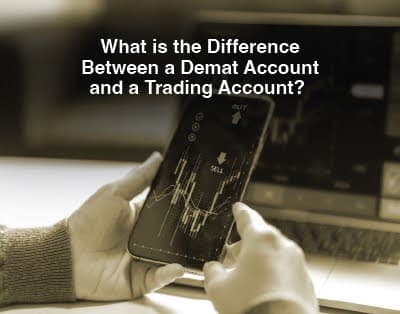What is the Difference Between a Demat Account and a Trading Account?

Table of Content
Terms like 'demat account' and 'trading account' can be confusing to those who are new to investing. A common misconception among new stock market participants is that these accounts have the same function. However, for effective investing, it is necessary to know the distinction between a trading account and a Demat account. This comprehensive blog explains in detail the functions of each account, their main variations, the fees associated with each, and how they work together to enable smooth trading.
What is a Demat Account?
The term 'dematerialised account', or 'Demat account' refers to an account that stores your financial securities in electronic format. Before this type of account was introduced in India in the 1990s, investors used actual share certificates, which presented many dangers, including loss, theft, and destruction.
For example, if you purchase the shares of a company, they are no longer issued as physical certificates but are instead safely maintained in electronic form in your Demat account. When you later decide to sell these shares, the transaction is completed electronically, debiting shares from your account without the need for written documentation.
What is a Trading Account?
A trading account serves as a means of buying and selling of assets on the stock exchange. It was created especially to make transactions easier. Think of a trading account as an intermediary that connects your bank account and Demat account. When you decide to buy stocks, money from your bank account is sent to your trading account, and the transaction is facilitated with the exchange .
Key Differences between Demat and Trading Accounts
Understanding the clear differences between these accounts helps manage your investment efficiently:
| Aspect | Demat Account | Trading Account |
|---|---|---|
| Functionality | Primarily serves as an electronic repository to safely store securities. | Enables investors to actively buy or sell these securities |
| Nature and Purpose | Functions like a secure digital vault, safeguarding your investment holdings. | Functions as a transaction-oriented account that executes orders. |
| Associated Charges | Typically involves annual maintenance charges (AMC), irrespective of trading activity | Often incurs transaction-based fees, like brokerage, varying with trade frequency and volume. |
| Necessity for Investing | Essential for holding securities electronically and securely. | Essential for placing orders and actively trading securities. |
| Operability | Usually passive; it does not actively facilitate transactions by itself. | Actively involved in facilitating trades and executing market orders. |
Practical Examples of Usage
Let's say you want to build an investment portfolio:
- Demat Account:You keep your government bonds, equities, and mutual funds that you frequently invest in safe in your Demat account. In this case, your Demat account's function is to safely store your investments so you may monitor them online without having to deal with paper records.
- Trading Account:Let's say you spot a lucrative investment opportunity. You log into your trading account and place a buy or sell order. This trade is executed and securities are credited or debited through the associated Demat account.
How Demat and Trading Accounts Work Together
While distinct, Demat and trading accounts operate together to simplify investment processes:
- Buying Securities:When you acquire shares, your trading account credits your Demat account with the purchased shares and takes funds out of your associated bank account.
- Selling Securities:On the other hand, when you sell shares, the proceeds are credited to your bank account via your trading account, and your Demat account is debited.
Because of this, both accounts are necessary and linked, guaranteeing safe and effective trading and investment management.
Which Account Should You Open First?
Due to their dependency, it is ideal to open both trading and Demat accounts at the same time. The majority of brokers provide bundled account services, which make the registration procedure much easier and let you begin investing right away. Combining the opening of these accounts simplifies your investing process and lessens administrative burdens.
Two Accounts that Work in Tandem
Understanding a clear distinction between trading and Demat accounts increases your financial literacy and makes investing much more interesting. Anyone hoping to manage their investment operations effectively must have a basic understanding of their separate but related tasks. With this information, investors can efficiently manage their portfolios, traverse financial markets with assurance, and make well-informed investment decisions.
Disclaimer
This is for educational/information purposes only. The general topic and information do not aim to influence the investment/trading decisions of any investors.
Open Free* Demat Account
Address
Registered Office:
Express Zone A Wing 10th Floor, Western Express Highway, Goregaon east, Mumbai - 400063
Corporate Office:
11th Floor, Times Tower, Kamala Mills, Senapati Bapat Marg, Lower Parel, Mumbai - 400 013
Quick Links
- AR Payment Gateway
- Associate Companies
- How to Pay with UPI
- CDSL Depository
- CDSL E-Voting
- Client Bank Details
- Collateral Details for Clients
- Company Profile
- Debt MF Commercials
- Disclaimer
- Early Payin of Funds
- Equity MF Commercials
- Form 15G
- Form 15H
- Link Pan with Aadhar
- Links to KRA
- NSDL Depository
- NSDL E-Voting
- ODR Portal
- Relevant Stock Exchange Rules/Regulations
- Trading Holidays
- Back Office
- MITC
- Vigilance Awareness
- ASBA
Anand Rathi Share and Stock Brokers Ltd.
SEBI Registration No.: INZ000170832 (BSE-949 | NSE-06769 | MSEI-1014 | MCX-56185 | NCDEX-1252), CDSL & NSDL: IN-DP-437-2019. *Research Analyst - INH000000834. PMS: INP000000282 is Registered under "Anand Rathi Advisors Limited" | MBD-INM000010478 is Registered under "Anand Rathi Advisors Limited"| NBFC is Registered under "Anand Rathi Global Finance Limited" Regn. No.: B-13.01682 | Insurance is Registered under "Anand Rathi Insurance Brokers Ltd." License No. 175. Insurance Corporate Agent: CA1048 (This registration shall be valid from 04-Jun-2025 to 03-Jun-2028).
Anand Rathi International Ventures (IFSC) Private Limited.
SEBI Registration No.: INZ000292939 (INDIA INX Member Code: TM - 5064 | NSE IX Member Code: TM -10048, IIBX Member Code: TM – 2011), IIDI DP ID 350071 AND Registration No.: IFSCA/DP/2022-23/007, IFSCA/CMI/Distributor/2023-24/0002. CIN No.: U65999GJ2016PTC094915. For any complaints email at Ifscgrievance@rathi.com. Regulator: International Financial Services Centres Authority (IFSCA)- https://www.ifsca.gov.in/
Disclaimer:
Equity: Investment in securities market are subject to market risks, read all the related documents carefully before investing.
The securities are quoted as an example and not as a recommendation.
Mutual Funds: Mutual Fund investments are subject to market risks, read all scheme related documents carefully before Investing. AMFI-Registered Mutual Fund Distributor: ARN-4478 (Initial Registration 4th Feb, 2003 & Valid From 2nd April, 2025 - 1st April, 2028) : Anand Rathi Share and Stock Brokers Ltd. | ARN-111569: Anand Rathi Wealth Limited | ARN-100284: AR Digital Wealth Private Limited.
IPO: Opening of account will not guarantee allotment of shares in IPO. Investors are requested to do their own due diligence before investing in any IPO.
*Third Party products: All third-party products like PMS, Mutual Funds, Fixed Income Products, IBS, Bonds, AIFs are not Exchange traded product and "ARSSBL" is just acting as distributor. All disputes with respect to the distribution activity, would not have access to Exchange investor redressal forum or Arbitration mechanism.
MTF: MTF is subject to the provisions of SEBI Cir. CIR/MRD/DP/54/2017 dt June 13, 2017 & terms and conditions mentioned in rights and obligations statement issued by the ARSSBL
Investment Baskets: Baskets are not Exchange traded product, all disputes with respect to this activity, would not have access to Exchange investor redressal forum or Arbitration mechanism.
Research Analyst: The views expressed in this website accurately reflect the personal views of the analyst(s) about the subject securities or issuers and no part of the compensation of the research analyst(s) was, is, or will be directly or indirectly related to the specific recommendations or views expressed by the research analyst(s). The advertisment are bound by stringent internal regulations and also legal and statutory requirements of the Securities and Exchange Board of India (hereinafter "SEBI").
Certification: Registration granted by SEBI and certification from NISM is in no way a guarantee of performance of the intermediary or provides any assurance of returns to investors.
*Award Winning Research: Anand Rathi Share and Stock Brokers Limited (Research Analyst) was awarded as "Best Equity Advisor" at World BFSI Congress & Awards 2022
*Client Data: Client data shown on this website is as on 31st March 2025
Trading View: Anand Rathi has partnered with TradingView for its charting technology. A global platform offering heatmaps, STOCK SCREENERS and market data.
By submitting this form, I hereby provide my explicit consent to be contacted by Anand Rathi Group and its associate companies via phone call, SMS, email, or WhatsApp for information related to products and services, even if I am registered on DND.
Attention Investors:
- For all communication related to vulnerability reporting, security alerts, or any other suspicious activity related to cyber security, contact priyanksheth@rathi.com/+91-22-62811514"
- For any complaints email at grievance@rathi.com, For DP related queries/complaints email at dp@rathi.com
- Filing of complaints on SCORES – Easy & quick a. Register on SCORES portal b. Mandatory details for filing complaints on SCORES: I. Name, PAN, Address, Mobile Number, Email ID c. Benefits: I. Effective communication ii. Speedy redressal of the grievances.
- Stock Brokers can accept securities as margin from clients only by way of pledge in the depository system w.e.f. September 1, 2020.
- Update your mobile number & email Id with your stock broker/depository participant and receive OTP directly from depository on your email id and/or mobile number to create pledge.
- Pay 20% upfront margin of the transaction value to trade in cash market segment.
- Investors may please refer to the Exchange's Frequently Asked Questions (FAQs) issued vide circular reference NSE/INSP/45191 dated July 31, 2020 and NSE/INSP/45534 and BSE vide notice no. 20200731-7 dated July 31, 2020 and 20200831-45 dated August 31, 2020 dated August 31, 2020 and other guidelines issued from time to time in this regard
- Check your Securities /MF/ Bonds in the consolidated account statement issued by NSDL/CDSL every month.




